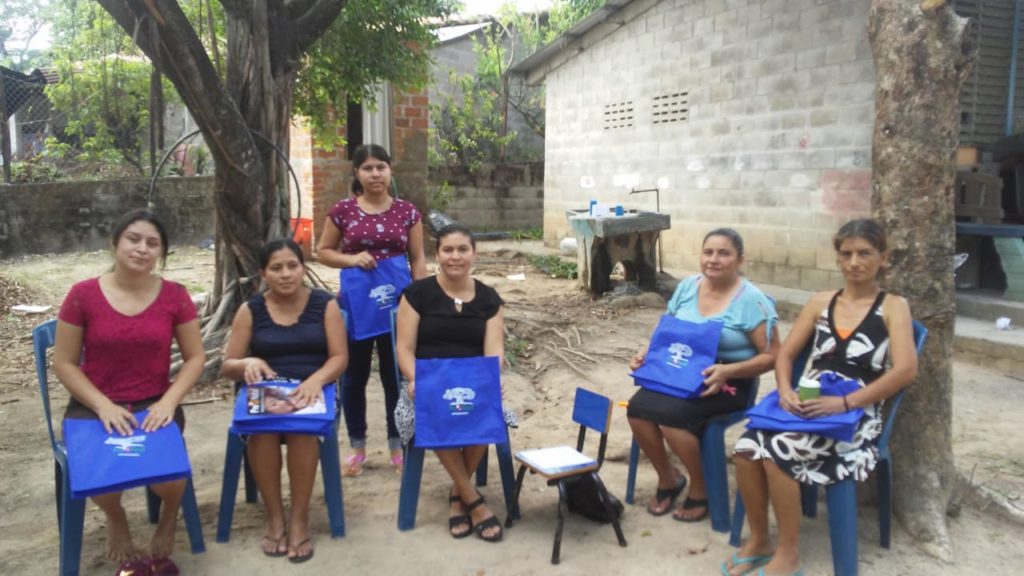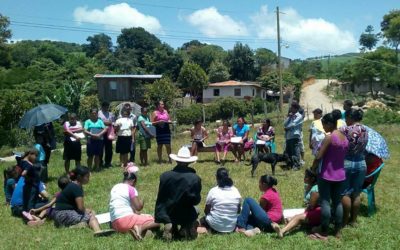🇸🇻 The two organizations have signed a Cooperation Agreement to develop training and awareness-raising processes, within the framework of the PreNatal Program. The execution of the project, in the midst of the current health emergency situation, is a sign of resilience when adapting a new methodology in an adverse situation.
The relationship between the Fundación de Waal (FdW) and the Asociación para la Organización y Educación Empresarial Femenina De El Salvador (OEF) began a decade ago. During this time, the two organizations have unified their efforts, knowledge and experiences to promote a culture of prevention of diseases and deficiencies that can cause disabilities in unborn babies and up to their first two years of life.
The training offered by the FdW to the OEF technical team included: Diplomas for technical personnel, Medium Course for 60 facilitators and Basic Course for about 500 community leaders from Family Circles. The Basic Courses were implemented by the Middle Course facilitators and are part of “a success story that we have maintained with OEF, addressing with the same logic that the Foundation has of forming the technical teams and then the target population that these institutions serve. With OEF we have maintained this methodology, with work started 10 years ago, and which has borne fruit by training guide mothers today ”, indicates Leonel López, director of the FdW in this country.
In February 2020, both organizations signed a new Cooperation Agreement to develop training and awareness-raising processes, within the framework of the PreNatal Program, to contribute to generating changes in the Salvadoran population and thus strengthen work with early childhood, in various communities of the country. The agreement, which is national in scope, lasts for five years and seeks to train 100 people as mediators and agents of change to promote actions for prenatal and postnatal prevention. Similarly, the actions include sensitizing 1,500 young people with the video workshop “#YoDecido”. Among the actions of adolescents and men and women of reproductive age, it is expected to reach more than three thousand people.
During the execution of the agreement, the declaration of a pandemic due to SARS -CoV-2 and the confinement measures to stop the contagions took place. For this reason, the face-to-face strategy of the Basic Course had to be reoriented towards a distance process. Leonel López explains that it was decided to take advantage of the communication structure that OEF already had with the communities it works with, through the WhatsApp application. The family circles received information on timely stimulation, videos or readings on their cell phones and in turn provided feedback with their comments or questions to the OEF staff.
When it was verified that the Basic Course could be linked to this methodology, the priority topics for OEF were selected and several explanatory videos were produced, which were sent to the WhatsApp groups. Previously, 15 facilitators were selected, who, in addition to having experience, must have passed the Middle Course and lived in areas with good Internet connectivity. It was decided to work with 10 municipalities, located in the departments of Chalatenango, San Salvador, Cabañas and Usulután, with a total of 117 registered, divided into the groups of the aforementioned social network, according to their location.

“Each group was managed by a facilitator and by the FdW technical team. The facilitators received the respective training, on the topics of the Basic Course, through videoconferences every Friday. On Mondays they shared this training and the videos in the groups they led. At the same time, the participants sent their criteria or the tasks that were requested of them, on Wednesdays ”, he indicates.
Mirna Linares, technical coordinator of the FDW Program in El Salvador, is satisfied with this process of adapting the methodology to the current situation. “One of the best results we have obtained is that we have managed to insert the PreNatal prevention message, not only in the people participating in the course, but also in their family circle, because the video that reaches the participant’s phone, sees it as a couple or as a family and this makes our messages much more communicable ”.
The role of the FdW, in responding to a challenge that arose in the training, allowed a new form of interaction with the members of the WhatsApp groups. “We were able to generate discussion and reflective analysis from the participants and that has helped OEF to consolidate an information network with the mother guides,” adds the Director of the FdW in El Salvador.
To this date, the results obtained are quite positive and within the situation we have described, they represent interesting lessons learned about the response capacity of the Fdw team in El Salvador. With 88% of participants who have passed the basic distance course and 1142 people of reproductive age, who have been reached with 326 virtual actions, the fulfillment of the Project’s objectives is reflected.
Mirna agrees with this achievement and describes the evaluation of the implementation of this section of the Agreement as “gratifying”. “We fulfilled what was projected at the beginning of the year and we have contributed to OEF having the information and material that was generated in the midst of a complex situation, such as the pandemic. And for the people who participated in the training it has been an opportunity for them to recognize that they can contribute in their community, so that Salvadoran children are born in good conditions “



